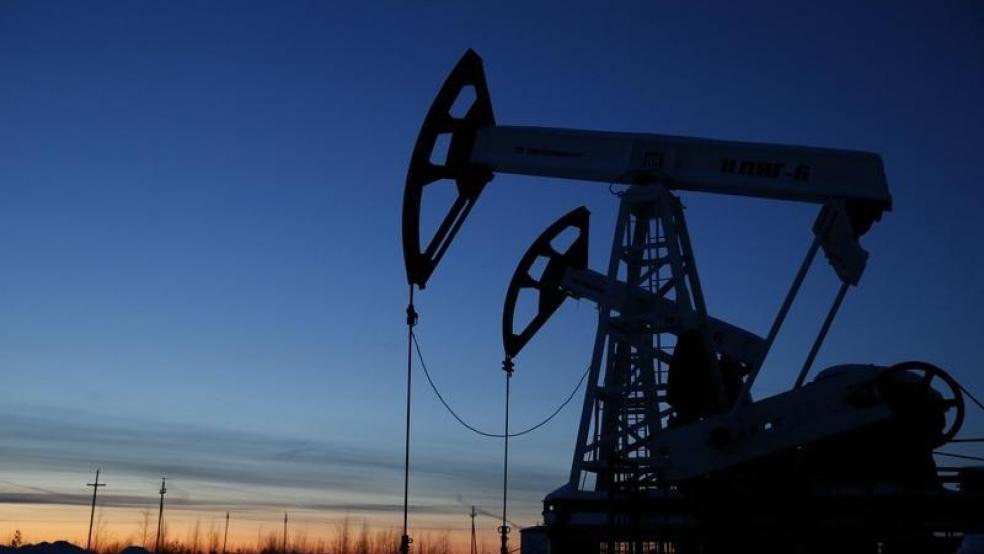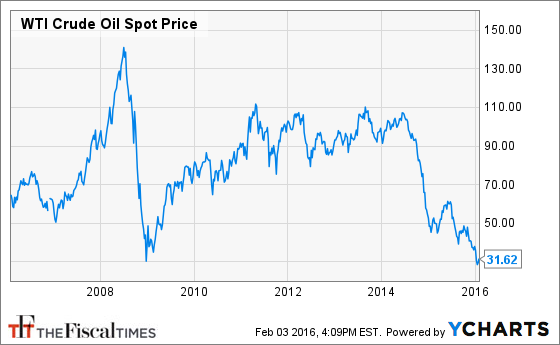The last time crude oil prices spent significant time below $30 a barrel Ben Affleck and Jennifer Lopez were still “Bennifer,” Howard Dean was leading the Democratic primary race and Saddam Hussein had just been captured by U.S. troops in Iraq.
It was December 2003 and the world was awash in oil. The OPEC cartel had ramped up production just as global demand was slowing, and the result was another drop in prices. Oil had been relatively cheap throughout the 1990s thanks to regulated production and price controls. But in the mid-2000s, prices began to rise in response to soaring demand from China, war in the Middle East and a weaker dollar, among other factors. Oil prices hit their peak in July 2008 at $145.29.
Related: How Plunging Oil Prices Could Create Economic Upheaval
Prices are now back down near 13-year lows after a period of stabilization between August 2009 and November 2014, when prices remained broadly between $70 and $120. Increased oil production around the world – especially in Saudi Arabia, Iran and the U.S. – amid slowing demand from China and Europe is the current source of the oil glut and low prices. “This is the most tremendous oversupply I’ve seen,” says Tom Kloza, co-founder and global head of energy analysis at the Oil Price Information Service.
WTI Crude Oil Spot Price data by YCharts
Some analysts have wondered why oil producers continue to pump crude at a time of massive oversupply. The usual answer is that countries like Saudi Arabia are simply trying to retain their market share. As a general rule, producers want to retain their portion of the market even as prices drop and then make up lost profits once prices rebound. A loss of market share is to be avoided at all costs because it can result in lower profits over the long haul.
But could there be more complicated and possibly nefarious geopolitical dynamics behind the glut? Sometimes markets are driven by more than just supply and demand. Oil is arguably the most important natural resource in the world. It shapes economies, starts and ends global conflicts, and props up national power, wealth and prestige. It stands to reason that countries might take extraordinary measures to control the flow of this precious commodity, above and beyond the market.
Here are five theories floating around about what’s “really” behind the incredible drop in the price of oil:
1. Saudi Arabia is plotting against Iran. Now that the sanctions against Iran have been lifted and Iranian oil can return to the world market, some people are wondering if Saudi Arabia is trying to sabotage Iran by holding down oil prices. Iran is poised to re-enter the global economy with a highly educated and young workforce and a strong manufacturing base and Saudi Arabia may be maneuvering to prevent Iran from reasserting itself and gaining more influence in the Middle East.
Although the Saudi foreign minister, Adel al-Juberi, denied a secret plot to hurt Iran to CNN’s Wolf Blitzer, suspicions remain among a few experts. “We have long believed that the Saudis are driving oil prices lower to inflict pain on Iran,” James Schumm, executive director and senior oilfield services analyst at Oppenheimer & Co., wrote in January.
Related: Why Oil Prices Will Rebound in 2016
2. The U.S. and Saudi Arabia are punishing Russia. Both Saudi Arabia and the U.S. are at odds with Russia. Russia is supplying Syrian President Bashar al-Assad with billions in weaponry and military support, placing it in conflict with Saudi Arabia, which vehemently opposes Assad’s regime. Putin’s territorial moves in the Ukraine have angered the U.S. government, as well as leaders of the European Union.
If Saudi Arabia and the U.S. are attacking Russia in a roundabout way with low oil prices, it’s been an effective tactic to cripple the country’s economy. About half of Russia’s budget revenue is tied to oil and gas exports, and plunging oil prices are wreaking havoc both on Russia’s energy industry and overall economy.
Russian officials recently said that they are willing to meet with Saudi Arabia to discuss strategies to stabilize crude prices, briefly sending prices higher. But many analysts doubt that anything will come of the proposal and the oil is still flowing freely, with Russian production recently hitting post-Cold War highs.
Although Kloza doesn’t think that the Saudis are specifically targeting Iran or Russia and are merely trying to increase their market share, “if in that plan, it weakens Iran and Russia, I think those are terrific byproducts,” Kloza says.
3. Obama is at war with the U.S. shale oil industry. One theory suggests that President Obama is working with Saudi Arabia to flood the global oil market, killing the U.S. shale oil industry in the process. One of Obama’s key concerns is the environment and the shale oil boom could slow the development of renewable energy.
Kloza says this theory is utterly preposterous. “Blaming the President or Congress for the oil price decline is akin to blaming them for El Nino. If only our government leaders had the power that fringe groups sometimes ascribe to them — we’d all be in clover,” Kloza says. Obama even touted low gas prices during his final State of the Union.
Related: 5 Ways Low Oil Prices Are Saving You Money
4. Saudi Arabia has overthrown OPEC. Every member of the cartel has indicated a willingness to meet and implement a unilateral OPEC production cut — except for Saudi Arabia.
Once an immensely powerful cartel that could shake national economies and whole industries, OPEC now lacks internal discipline and members are subject to the pain of plummeting oil prices as much as the rest of the world. Venezuela, which relies on oil for nearly all of its exports, has declared a nationwide economic emergency. Nigeria’s economy and currency have plunged into disarray. But Saudi Arabia keeps pumping.
Is Saudi Arabia now abandoning the other members of the cartel? The kingdom is able to withstand deep price cuts thanks to its massive crude reserves. Perhaps Saudi Arabia is squeezing all of the other countries to knock them out of the game. Kloza says that the kingdom is a very low-cost producer and “can hold its hand over the $20 flame for a long time. But we’d have to have a GoPro or bugs inside the royal palace to know what they’re doing.”
Venezuela has proposed an emergency meeting of the 13 members of OPEC, but so far only Algeria, Nigeria and Ecuador have expressed interest. In order for an emergency meeting to take place, all members must back the idea.
Related: Why Oil Prices Could Really Collapse to $20 a Barrel in 2016
5. Saudi Arabia is at war with the U.S. shale oil industry. Largely due to the boom in the shale industry, U.S. oil production increased sharply after 2011. Production surged to 8.7 million barrels a day in 2014 , up from 7.5 million barrels a day the year before, and has only kept growing since then. The U.S. now pumps around 9.5 million barrels a day, or roughly 10 percent of the world’s oil supply, making it the third-largest producer in the world.
Saudi Arabia has never admitted it publicly, but many experts believe it has ramped up production in an effort to protect its market share in the face of the U.S. shale boom. After boosting its production, Saudi Arabia then pushed down oil prices by increasing the discount that it offered in India and China to hurt the U.S. even more. Leonid Bershidsky, a BloombergView columnist, thinks that the kingdom is trying to push American companies out of business in order to teach the market a lesson: “that they are the go-to suppliers at any price level and that they’re always going to be there, unlike those fly-by-night American operators.”
Unlike some of the wilder theories on the list, this one actually has some weight. Over the past few years, U.S. dependence on Saudi oil has greatly diminished as refiners have switched over to oil from the shale boom.
But there are some skeptics. Denton Cinquegrana, chief oil analyst at Oil Price Information Service, says that even with the recent end of the ban on domestic crude exports, U.S. oil just isn’t a big enough threat to Saudi Arabia’s global market share to spur this kind of painful price war.






